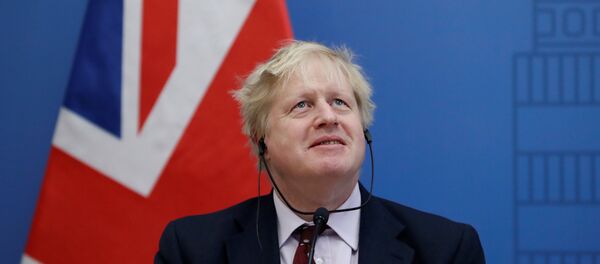Boris Johnson called Muslim head veils 'oppressive' for women and said it is "absolutely ridiculous that people should choose to go around looking like letter boxes."
"If you say that it is weird and bullying to expect women to cover their faces, then I totally agree — and I would add that I can find no scriptural authority for the practice in the Koran," Mr. Johnson wrote in his Daily Telegraph weekly column.
He also added that he would "feel fully entitled to ask" a female constituent to remove her veil so that he "could talk to her properly."
"If a female student turned up at school or at a university lecture looking like a bank robber then ditto: those in authority should be allowed to converse openly with those that they are being asked to instruct," Mr. Johnson said.
Reactions to Mr. Johnson's comments poured in on social networks, alleging he represented the widespread Islamophobia within the Tory party, normalized far-right rhetoric and attempted to regain support of now UK Independence (UKIP) party members. Others, however, agreed that elements of discussed dress code are inappropriate in the British society.
Boris wants Trump Britain, I don't!
— Julie Ley Gibbs#FBPE#PeoplesVote#StopBrexit (@JulieLeyGibbs) August 6, 2018
I do not agree with Johnson on anything but I do think the ISIS dress code is inappropriate for UK
— Linda (@sugarloaf147) August 6, 2018
The fact that Boris Johnson believes comments like these will help him win the Tory leadership tells you everything you need to know about the Islamophobia problem in the Conservative party. https://t.co/AMPOfZ0LLI pic.twitter.com/aMRbqFAMqL
— Adam Bienkov (@AdamBienkov) August 6, 2018
Dear @EHRC I'd like to report Boris Johnson for refusing a service to someone based on at least two of the protected characteristics outlined in the Equality Act, 2010. Thanks will send official notice shortly https://t.co/2QCP0EVyF8
— Jess Phillips (@jessphillips) August 6, 2018
If only there were some way of knowing what might have prompted Boris Johnson to fan hatred of Muslims? pic.twitter.com/jCMLDfy9pk
— David Schneider (@davidschneider) August 6, 2018
Here’s our former top diplomat Boris Johnson comparing women wearing niqabs to letter boxes. pic.twitter.com/qIVjxo2zHO
— Ashley Cowburn (@ashcowburn) August 6, 2018
It’s not ok for Boris Johnson to compare niqab-wearing women to bank robbers and letter boxes. I’m sick of what we consider to be our authority figures legitimising a prejudice that results in Muslim women having their clothing pulled off on the streets of Britain.
— aleesha (@a_leesha1) August 6, 2018
Utterly pathetic name calling of Boris Johnson today by the PC Left. Having people covered head to foot in veils and robes in our public places is obviously terrible for social integration and also looks ridiculous. These are just common sense observations.
— Patrick O'Flynn (@oflynnmep) August 6, 2018
His final Bannonised push for power. Almost certain to succeed.
— John Woodman (@jwripple) August 6, 2018
The comments by Britain's former top diplomat come after Denmark banned clothing hiding a person's face, including some traditional Islamic headwear such as niqabs and burqas. The ban took effect on August 1, 2018.
Mr. Johnson however argued against the total ban, suggesting it "would play into the hands of those who want to politicize and dramatize the so-called clash of civilizations."
"You risk turning people into martyrs, and you risk a general crackdown on any public symbols of religious affiliation, and you may simply make the problem worse," Mr. Johnson said.
On August 4, Danish police fined a 28-year-old woman for wearing a niqab — a traditional Arab headdress that conceals the face and only leaves an open slot for the eyes — in a shopping center.
READ MORE: 'Great News': Public Reacts to Denmark's First Fine for Violating Full Veil Ban
According to the title of his column, Mr. Johnson believes that "Denmark has got it wrong" and even though "the burka is oppressive and ridiculous," it is "still no reason to ban it."
Boris Johnson has resigned from the post of Britain's Foreign Minister early July. During his time as UK's top diplomat, Mr. Johnson was embroiled in numerous gaffes and scandals, which saw critics call for his resignation.
READ MORE: The 'Best' of Boris: UK Top Diplomat & the Art of Being Ill-Equipped





